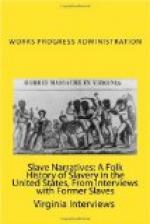The early life of Duncan was carefree and happy. With the exception of carrying water to the laborers and running errands, he had little to do. Most of the time of the slave children was spent in playing ball and wrestling and foraging the woods for berries and fruits and playing games as other children. They were often joined in their play by the master’s children, who taught them to read and write and fired Duncan with the ambition to be free, so that he could “wear a frill on his colar and own a pair of shoes that did not have brass caps on the toes” and require the application of fat to make them shine.
Wearing his shoes shined as explained above and a coarse homespun suit dyed with oak bark, indigo or poke berries, he went to church on Sunday afternoons after the whites had had their services and listened to sermons delivered by white ministers who taught obedience to their masters. After the services, most of the slaves would remove their shoes and carry them in their hands, as they were unaccustomed to wearing shoes except in winter.
The women were given Saturday afternoons off to launder their clothes and prepare for Sunday’s services. All slaves were required to appear on Monday mornings as clean as possible with their clothing mended and heads combed.
Lye soap was used both for laundering and bathing. It was made from fragments of fat meat and skins that were carefully saved for that purpose. Potash was secured from oak ashes. This mixture was allowed to set for a certain period of time, then cooked to a jelly-like consistency. After cooling, the soap was cut into square bars and “lowanced out” (allowance) to the slaves according to the number in each family. Once Duncan was given a bar of “sweet” soap by his mistress for doing a particularly nice piece of work of polishing the harness of her favorite mare and so proud was he of the gift that he put it among his Sunday clothes to make them smell sweet. It was the first piece of toilet sopa that he had ever seen; and it caused quite a bit of envy among the other slave children.
Duncan Gaines does not remember his grandparents but thinks they were both living on some nearby plantation. His father was the plantation blacksmith and Duncan liked to look on as plowshares, single trees, horse shoes, etc were turned out or sharpened. His mother was strong and healthy, so she toiled all day in the fields. Duncan always listened for his mother’s return from the field, which was heraled by a song, no matter how tired she was. She was very fond of her children and did not share the attitude of many slave mother who thought of their children as belonging solely to the masters. She lived in constant fear that “old marse Seever” would meet with some adversity and be forced to sell them separately. She always whispered to them about “de war” and fanned to a flame their desire to be free.
At that time Negro children listened to the tales of Raw Head and Bloody Bones, various animal stories and such childish ditties as:




